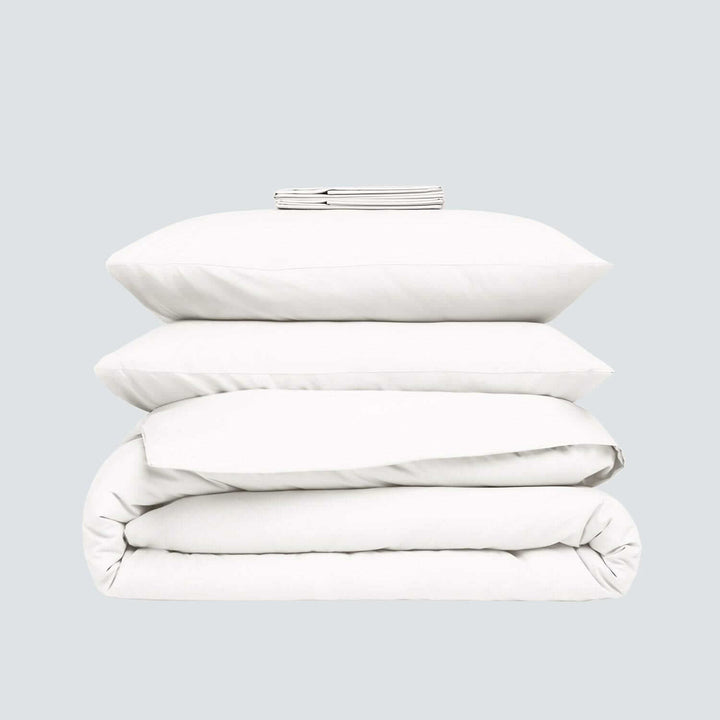Table of Contents
- Understanding sleep hygiene
- Importance of eco-friendly bedding for sleep hygiene
- Advantages of using eco-friendly bedding
- Types of eco-friendly bedding materials
- Choosing the right eco-friendly bedding for your needs
- Tips for improving sleep hygiene with eco-friendly bedding
- Creating a comfortable sleep environment with sustainable bedding
- Maintaining eco-friendly bedding for better sleep hygiene
- Addressing common concerns about eco-friendly bedding choices
- Conclusion: Achieving better sleep hygiene with eco-friendly bedding
- FAQs on Wool Duvet Inserts, Comforters & Sustainable Bedding
Understanding sleep hygiene
Good sleep hygiene means creating a sleep-friendly environment and adopting habits promoting better sleep. Regarding bedding choices, eco-friendly options can contribute positively to your sleep hygiene. Materials like organic cotton, bamboo, and linen are known for their breathability and natural properties that can help regulate your body temperature and wick away moisture. This can lead to a more comfortable and restful sleep. Additionally, eco-friendly bedding choices are often free from harmful chemicals and pesticides, enhancing overall sleep quality.
Importance of eco-friendly bedding for sleep hygiene
Choosing eco-friendly bedding can significantly enhance your sleep hygiene. Eco-friendly bedding promotes a healthier and more sustainable sleep environment with materials like organic cotton, bamboo, and hemp. These materials are hypoallergenic, breathable, and free from harmful chemicals, ensuring that your sleep is restful and environmentally conscious. Opting for eco-friendly bedding can reduce your carbon footprint while prioritizing your comfort and well-being.
The commitment to a healthier sleep environment begins with the materials and where they come from. Our choice to use wool from Regenerative Organic farms goes far beyond simple sustainability. This method of Regenerative Agriculture actively heals the land by rebuilding soil health, capturing carbon, and boosting biodiversity. This commitment ensures our wool is entirely Non-Toxic and certified Hypoallergenic, delivering a clean, chemical-free product that supports your health, the sheep's well-being, and the planet's vitality.
Advantages of using eco-friendly bedding
Choosing eco-friendly bedding has several advantages for both your health and the environment. Here are a few benefits:
- Healthier Sleep Environment: Eco-friendly bedding is made from natural materials, which means they are free from harmful chemicals and toxins that can affect your sleep quality.
- Sustainable Production: Eco-friendly bedding is often produced using sustainable methods, reducing the environmental impact of manufacturing and promoting ethical labor practices.
- Reduced Allergies: Natural fibers such as organic cotton and bamboo are hypoallergenic, making them an excellent choice for people with allergies or sensitive skin.
- Longevity: Eco-friendly bedding made from high-quality materials is often more durable, meaning it can last longer and reduce the frequency of replacements, saving you money in the long run.
When searching for truly Temperature Regulating Bedding, many people compare a natural Wool Comforter with cheaper synthetic alternatives. While synthetic duvets are low-cost, materials like polyester trap heat and moisture, which often leads to clammy night sweats and disturbed rest for Hot Sleepers. In contrast, wool is nature's most advanced fiber: it has superior Moisture Wicking ability to keep you dry and maintains exceptional Air Circulation, ensuring a consistent, restful sleep every night. Choosing wool means choosing long-term durability and proven performance over temporary, cheaper fixes.
Organic Wool Bedding Set

$598.40
$748.00
Cooler Nights & Deeper Sleep — Every Night Elevate your sleep with our organic wool bedding set, crafted from regenerative New Zealand wool and organic cotton for balanced, all-season comfort. These breathable, eco-friendly fibers naturally wick away heat and moisture… Read more
Types of eco-friendly bedding materials
Bamboo and organic cotton are popular eco-friendly bedding materials. Bamboo is known for its softness, breathability, and moisture-wicking properties. It's also naturally hypoallergenic and resistant to odors. Organic cotton is grown without synthetic pesticides or fertilizers, making it better for the environment. It's also breathable and gentle on the skin, offering comfort for a good night's sleep.
Choosing the right eco-friendly bedding for your needs
Consider materials like organic cotton, bamboo, or hemp when choosing eco-friendly bedding. These materials are sustainable and free from harmful chemicals. Look for Global Organic Textile Standard (GOTS) and OEKO-TEX certifications to ensure the bedding meets environmental and health standards. Additionally, prioritize bedding that is biodegradable and recyclable to reduce environmental impact. Remember that natural fibers like cotton and linen are more breathable, while bamboo and Tencel are moisture-wicking and antimicrobial. Select bedding that suits your sleep needs and values sustainability.
Tips for improving sleep hygiene with eco-friendly bedding
Eco-friendly bedding, including organic cotton, bamboo, and linen, can contribute to a better sleep environment. These materials are known for their breathability, moisture-wicking properties, and hypoallergenic features, making them ideal for promoting quality sleep. Choosing bedding made from sustainable and natural materials can also reduce exposure to harmful chemicals often found in conventional bedding. Consider investing in eco-friendly bedding options to improve your overall sleep hygiene.
Creating a comfortable sleep environment with sustainable bedding
If you want a comfortable and sustainable sleep environment, investing in eco-friendly bedding choices is the way to go. Opting for organic cotton, bamboo, or hemp bedding can help create a cozy and environmentally friendly sleep space. These sustainable materials are luxurious and gentle on the planet, making them an excellent choice for enhancing sleep hygiene.
Maintaining eco-friendly bedding for better sleep hygiene
Opt for organic cotton, bamboo, or linen sheets for sustainable bedding. These materials are grown and processed without harsh chemicals, making them an environmentally friendly option for your bed. Organic cotton is known for its softness and breathability, while bamboo is naturally hypoallergenic and antimicrobial. Linen sheets are durable and become softer with each wash, providing a long-lasting, eco-friendly bedding option. Choosing these materials can improve your sleep hygiene while reducing your environmental impact.
Addressing common concerns about eco-friendly bedding choices
When choosing eco-friendly bedding, people often have shared concerns about the durability and comfort of the materials. Additionally, some may question the affordability of eco-friendly options and whether they are better for the environment. Addressing these concerns is essential, as they can influence the decision-making process when transitioning to sustainable bedding choices.
Organic Wool Bedding Set (Insert + Cover)

$475.15
$559.00
Cooler Nights & Deeper Sleep — All Year Long A complete organic wool bedding set featuring our organic wool insert paired with a breathable organic cotton cover — designed to work together for easy, all-season sleep. What’s Included: 1 ×… Read more
Conclusion: Achieving better sleep hygiene with eco-friendly bedding
When improving your sleep hygiene with eco-friendly bedding, it's essential to prioritize natural and sustainable materials such as organic cotton, bamboo, or hemp. These materials are known for their breathability, moisture-wicking properties, and hypoallergenic nature, which can contribute to a more comfortable and restful sleep environment. Additionally, incorporating eco-friendly bedding choices like natural latex or wool mattresses, as well as chemical-free dyes and finishes, can further enhance the overall sustainability of your sleep space. Making mindful choices in your bedding selection supports eco-friendly practices and promotes a healthier and more rejuvenating sleep experience for you.
Achieving Better Sleep isn't just about what's inside your bedding, but what's covering it. Many Hot Sleepers seek out that signature cool, crisp feel, and that's precisely what our outer material delivers. We pair the advanced moisture management of our wool with the breathability of organic cotton percale. This renowned fabric has a crisp, matte finish and is known for its superior air circulation and durability, creating the ideal all-season sleep environment that is as luxurious as it is healthy.
FAQs on Wool Duvet Inserts, Comforters & Sustainable Bedding
How should I properly care for my new Wool Comforter to ensure longevity?
Wool is naturally resistant to dirt and dust. We recommend regular airing outside to refresh the fibers. Always use a protective duvet cover. For washing, follow the specific instructions on the label to ensure the longevity of your Wool Comforter and prevent shrinkage.
Is your bedding naturally flame retardant without the use of toxic chemicals?
Yes. Wool is a naturally fire-resistant fiber. We are proud that our products are entirely Non-Toxic and achieve fire safety standards without the use of harsh chemical fire retardants found in many synthetic alternatives.
What is the benefit of a "Regenerative Organic" certification?
Regenerative Organic is the highest standard, requiring the use of certified organic farming combined with practices that actively improve the ecosystem. This approach rebuilds Soil Health, sequesters carbon, and ensures ethical sourcing.
How does organic cotton percale compare to other sheet materials like sateen or linen?
organic cotton percale is known for its cool, crisp feel, similar to a high-end hotel sheet. Its tight weave allows for superior air circulation, making it excellent for Hot Sleepers, especially when compared to warmer sateen or less durable linen.
Does wool's natural lanolin cause allergic reactions or require chemical cleaning?
Our wool is scoured and processed using safe, Non-Toxic methods that remove the majority of lanolin. The resulting clean, natural wool is certified Hypoallergenic and deters dust mites, making it an excellent choice for those with sensitive skin or allergies.




